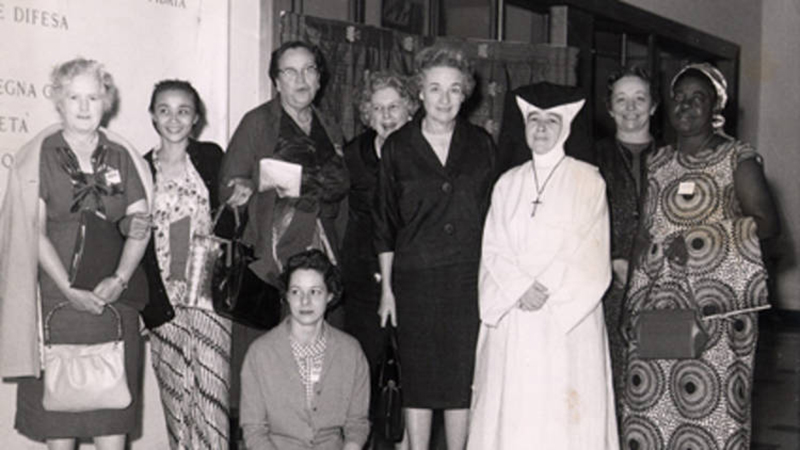Supporting Lebanese and refugee women

Neil Roper talks to Margaret Clark, President of the National Board of Catholic Women (NBCW), about the year of fundraising for CAFOD’s 60th anniversary and invites you to a quiz on Saturday May 7th at 7pm, raising money to support vulnerable Lebanese and refugee women.
To celebrate CAFOD’s founding mothers and the continued importance of our joint mission, the National Board of Catholic Women (NBCW), Union of Catholic Mothers (UCM) and Catholic Women’s League (CWL) launched a year of collaboration with CAFOD. As part of that year, we are holding an online quiz on Saturday May 7th at 7pm.
Margaret reflects on some of her highlights of this year of fundraising:
“We held a quiz earlier in our year of fundraising, which was a great time of fun, friendship, and encouragement.”
“I remember there was an online talk from Mary Lucas, who works with CAFOD alongside the partners in Lebanon, which was very informative, letting everyone know the needs of the project in Lebanon.”
“UCM groups have held some wonderful local fundraising in York and Exeter as part of the year of fundraising.”
“We have been trying to raise £40,000 through the year, and although we have a long way to go, we hope that these last few months (the fundraising drive ends in June ‘22) will see the total rise significantly.”
“Throughout this time, we have been trying to connect with the Lebanese community as we try to raise money and awareness of the courage and bravery of women in a desperate situation.”
The project is in Lebanon, a tiny country less than half the size of Wales, which is currently hosting over 1 million Syrian refugees on top of more than 400,000 Palestinian refugees already living in the country. This is all despite high levels of poverty and unemployment among its own population.
This initiative will support vulnerable Lebanese and refugee women, many of whom are survivors of violence or have had to flee their homes due to the conflict in Syria.
The project will play a vital role in equipping and empowering women leaders to create spaces in their communities for women to address issues of discrimination, trauma, and stress. By offering opportunities for training and income generation, these women will be able to draw on their own skills and experience to increase their resilience for the future. As it brings together women from both Lebanese and Syrian communities, it will also contribute to a more peaceful community life.
This project really reminds me of the first Fast Day, as Elspeth Orchard reflected:
“We weren’t doing anything special; we were just doing what we thought we ought to do, remembering that we are all God’s children.”
Led by Jacquie Stuyt, Evelyn White, Nora Warmington and Elspeth Orchard, women from NBCW, CWL and UCM came together to organise the first Family Fast Day in 1958. They asked children to give up their sweets and for their parents to make just one main meal for the family – the cheapest possible – and give the money they saved to feed people who were hungry.
The organisers hoped to raise £500 for a mother and baby clinic in Dominica, but as Sister Frances Orchard (Elspeth’s daughter) remembers, they far exceeded that target:
“To the surprise of everyone the envelopes with cheques and postal orders came in by the sack full. Every now and again we stopped to read out a particularly touching letter. The one I remember was from a widowed pensioner who wrote: my pussycat and I went without our lunch today, and she had enclosed a postal order for 2/6d (approximately 25p in today’s money). But all the 25p-s added up and the total sum was £6,673.9s7d, the equivalent of £96,000 today. Two years later CAFOD was officially founded.”
As we remember all that has happened in the 60 years since that first Fast Day, we would love for you to join us for the quiz on May 7th at 7pm and donate or fundraise using the JustGiving page below.
The following amounts show what your gift could provide:
- £22 provides informal mental health support and referrals to a vulnerable woman survivor (of violence e.g., domestic violence and/or trauma – e.g., fleeing Syria).
- £250 provides 30 hours of informal/vocational training to vulnerable women to learn new skills and increase their resilience.
- £430 provides 60 hours of training for a vulnerable woman in home and community health care (leading to employment in hospitals and care facilities as well as providing care in the community).
- £2,000 will train and resource three women’s committees which provide informal mental health support and referrals to vulnerable women who may be survivors of violence/trauma (both Lebanese and Syrian)